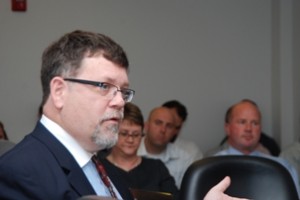
Clean Elections director Todd Lang speaks to the board during a special meeting June 9 that explored whether the commission could lift spending limits on publicly funded candidates in light of the U.S. Supreme Court decision to halt matching funds. The commission ultimately decided there was little it could do. (Photo by Josh Coddington)
The Citizens Clean Elections Commission decided there is little it can do to help publicly funded candidates who are suddenly without matching funds, and Gov. Jan Brewer won’t throw it the lifeline it’s asking for either.
The commission on June 9 adjourned without voting on a proposal to allow publicly funded candidates to raise campaign cash from private donors, with commissioners saying they were prohibited by statute, by a U.S. District Court ruling or by both.
The change was requested by the Brewer campaign, which will have only $707,000 to take on an opponent who has already spent $2.3 million. She is one of 42 candidates who have already received Clean Elections money, according to the commission, and under state law they cannot give the money back and switch to private funding once they’ve received their campaign cash.
The commissioners all agreed that the June 8 U.S. Supreme Court ruling that blocked the state from distributing matching funds was unfair, but were unsure whether they were allowed to declare an emergency, which would have lifted fundraising restrictions on Clean Elections candidates.
“I feel that our hands are tied at this point legally and it’s very frustrating,” said Commissioner Gary Scaramazzo.
Clean Elections Director Todd Lang said the commission would draft a resolution asking Brewer to call a special session to raise the lump sum that publicly funded candidates are given for their campaigns. Brewer spokesman Paul Senseman said the governor had no intention of calling a special session.
“The governor is aware of the CCEC’s request and the governor is not interested in calling a special session,” Senseman told the ~Arizona Capitol Times~.
The commission also asked its legal counsel to examine a January ruling by U.S. District Court Judge Roslyn Silver to see if there was any way they could alleviate the loss of matching funds. Several commissioners sounded eager to permit publicly funded candidates to engage in additional fundraising, but after returning from executive session, all acknowledged that they were probably barred from doing so by Silver’s ruling.
“I think it would behoove participating candidates if the governor and the Legislature go back into special session and immediately increase the amount that participating candidates get for all races,” Commissioner Lori Daniels said after the commission met in executive session for about a half-hour. “While I would like to see if we could do some other issues, I don’t think legally, after the advice that we’ve had, we cannot invoke an emergency rule.”
The commission’s debate centered on a statute which allows it to declare an emergency and allow private fundraising by publicly funded candidates if the commission cannot pay them the money they are due under the Clean Elections system. But the meeting started off with a bad omen for those who wanted additional fundraising, with Assistant Attorney General Joe Barton telling the commission that it could not do so without applying another Clean Elections statute that Silver struck down.
Commissioner Louis Hoffman, who helped write the 1998 ballot measure that created the Clean Elections system, said he believed the statute could be applied to the current situation, but that Silver’s ruling prohibited it. Silver’s ruling struck down the provision of the Clean Elections system that provides for equal funding of candidates.
“Were it not for the court’s order or the wording on the court’s injunction, specifically, I personally would be voting to declare an emergency,” Hoffman said.
Daniels said the Supreme Court’s ruling was unfair to publicly funded candidates, but didn’t think the statute permitted the commission to allow additional fundraising.
“I think I was about five when my mom told me that life isn’t fair and things happen,” Daniels said. “I don’t think we have the right to declare an emergency.”
Daniels also voiced a philosophical objection to allowing Clean Elections candidates to conduct private fundraising. Permitting candidates to raise more than the token amounts they get from $5 contributions and seed money – with its $140 maximum per person – would defeat the purpose of running a publicly funded campaign, she said.
“This muddies the whole water between Clean Elections and privately funded elections,” she said.
Legislative candidate Tony Bouie, a plaintiff in the lawsuit against matching funds, also argued that allowing more fundraising by publicly funded candidates would be self defeating for the Clean Elections system.
“If you make a decision that undermines everything you’ve done in the public’s eye in the past, trying to create a system where the appearance of corruption is gone from politics … you do yourself a long-term disservice. My suggestion is to let the system play out,” he said.
Lang suggested that Brewer and other publicly funded candidates could file suit regarding the loss of matching funds.
Lisa Hauser, a campaign attorney for Brewer, said she did not know what course of action the campaign would take. She said the campaign would likely wait until the commission determined what, if anything, it could do to help publicly funded candidates who lost their matching funds.
Matching funds were scheduled to begin going out on June 22.
 Arizona Capitol Times Election Coverage Your Inside Track to Arizona Elections
Arizona Capitol Times Election Coverage Your Inside Track to Arizona Elections
One comment
Pingback: Clean Elections won’t allow more fundraising | phoenix.rssible.com